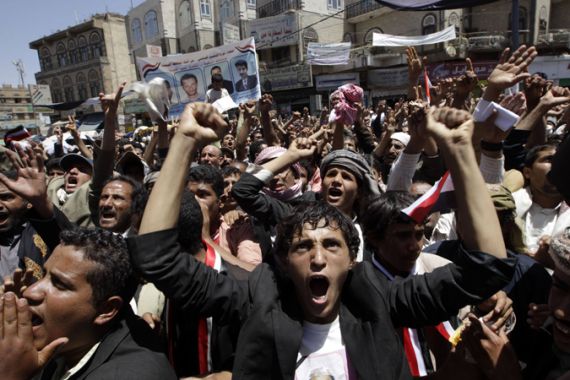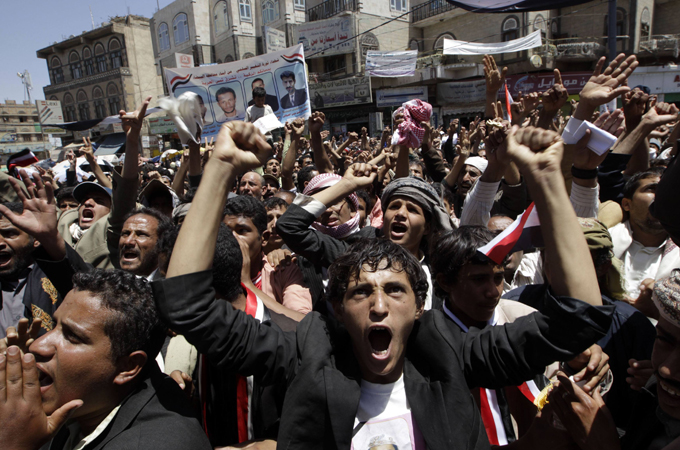Yemeni protesters call for march on palace
Opposition groups vow to oust Ali Abdullah Saleh from power as parliament approves emergency laws after weeks of unrest.

 |
| Opposition groups continue to demand that president Ali Abdullah Saleh step down [Reuters] |
Opposition groups in Yemen have called on protesters to march on president Ali Abdullah Saleh’s palace in the capital Sanaa on Friday as th country’s parliament approved emergency powers which have been used by security forces to crack down on dissent.
“Friday will be the ‘Friday of the March Forward’, with hundreds of thousands of people… We will arrive where you are and we will remove you,” opposition spokesman Mohamed Qahtan told Al Jazeera on Wednesday.
The announcement also comes after thousands of protesters gathered in front of Sanaa University, as parliament approved a request by Saleh to impose emergency law for 30 days.
Nearly 3,000 demonstrators chanted outside the university, and some painted their body in the red, white and black colours of the national flag, as they voiced their opposition to the law.
The adoption of the emergency request was a virtual certainty because Saleh’s ruling party dominates the 301-seat legislature. It also follows a violent crackdown on anti-government demonstrators, with security forces killing more than 40 protesters on Friday in Sanaa.
Defections
Defections including generals, tribal leaders, diplomats and ministers, have also gained momentum after Saleh sacked his cabinet and requested a state of emergency.
On Wednesday, protesters carried placards saying “No to emergency rule, you butcher!” Some had begun selling T-shirts saying “I am a future martyr”.
“As sure as the sun is in the sky, he will go,” Suleiman Abdullah, a protester, told Reuters news agency.
Complaining of neglect, Yemeni southerners have said they want to secede from the north and have staged several rebellions against Saleh, now facing the biggest fight of his political life.
| Related |
| Fear of the future in Yemen |
Long backed by Arab and Western countries as the strongman holding the fractious tribal country together, Saleh is raising the spectre of civil war and disintegration if he is forced out in what he says would be a coup.
Defections among the ruling elite have reached senior military commanders, including General Ali Mohsen, commander of the northwest military zone and Saleh’s kinsman from the powerful al-Ahmar clan.
“They call for the regime going and that means chaos and destruction. Yes, the regime could go, but via democratic means and that involves the ballot box and elections. Coups are rejected,” Saleh told a meeting of tribal figures on Wednesday.
Tension among rival military forces has also led to violence.
Presidential guards – a force commanded by Saleh’s son Ahmed – surrounded an air force battalion in the coastal city of Hudaida after its commander said he supported the protesters.
A presidential guard and a soldier died in clashes between the two forces in the southern coastal city of Mukalla late on Monday, medical sources said.
But protesters are divided over what they think of Ali Mohsen, who was commonly regarded as the second most powerful man in the country before he decided to defect.
‘Corrupting the revolution’
Some protesters have displayed his picture on their tents but the opposition regard his motives with suspicion and would not want him to have a role in any future transitional government.
Followers of the Houthi movement of Zaidi Shias in the north said he was responsible for the army’s conduct during rebellions of recent years.
“We see Ali Mohsen’s joining us as a corruption of the revolution. The revolution is not against an individual but against a system,” said Abdullah Hussein al-Dailami, a protester from Saada in the north. He said Mohsen had been Saleh’s accomplice.
The United States, grappling with the diplomatic fallout of uprisings and uncertainty across the Arab world, has voiced rare public alarm about the situation in Yemen and the possible fall of someone seen as an ally in the fight against al-Qaeda.
Opponents also complain that Yemen under Saleh has failed to meet the basic needs of the country’s 23 million people.
Unemployment is around 35 percent and 50 percent for young people. Oil wealth is dwindling and water is running out.
Al Jazeera shut down
Authorities in Yemen closed down the offices of Al Jazeera in Sanaa on Wednesday and withdrew the press accreditation of all Al Jazeera staff in the country.
Yemen, which has accused Al Jazeera of bias in favour of the demonstrators, last Saturday ordered two Al Jazeera correspondents to leave the country, saying they were working illegally and had acted unprofessionally.